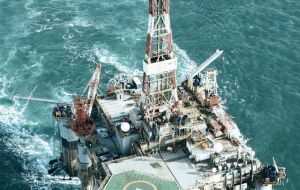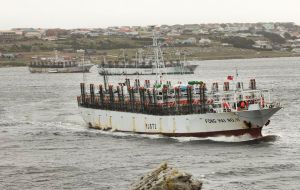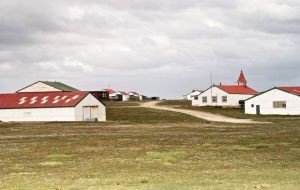MercoPress. South Atlantic News Agency
Falklands' economy performance impressive, although volatile and vulnerable
 Oil was discovered in 2010 on the Sea Lion field and production for the world markets is currently planned for 2019.
Oil was discovered in 2010 on the Sea Lion field and production for the world markets is currently planned for 2019.  Fisheries revenues have been strong and lamb and mutton exports growing, while cruise ships have started to recover (Pic N. Bonner)
Fisheries revenues have been strong and lamb and mutton exports growing, while cruise ships have started to recover (Pic N. Bonner)  Rural population has been declining since the 80s and “the very low population density poses a challenge for rural economy and the traditional agricultural sector”.
Rural population has been declining since the 80s and “the very low population density poses a challenge for rural economy and the traditional agricultural sector”. The Falkland Islands economy has witnessed impressive, although volatile, growth in recent years with unemployment rates low enough to be the envy of most countries in the world and the government is free of debt, according to the latest “State of the Economy” released by the Falklands Policy Unit.
However there is some uncertainty regarding the future of the economy since it is based on just a few commodities and is vulnerable to their market prices, besides the fact that the Falklands continues to face chronic challenges typical to small and remote economies.
“The Falkland Islands economy has performed well in recent years. Oil was discovered in 2010 on the Sea Lion field and production for the world markets is currently planned for 2019. Further oil and gas exploration took place from 2010 to 2012 giving a boost to the local economy and a new round commenced in 2015” points out the report which at the same time underscores that fisheries revenues have been strong and lamb and mutton exports growing.
“Cruise ship visits have also started to recover after several years of decline. The economy has witnessed impressive, although volatile, growth. Unemployment rates are low enough to be the envy of most countries in the world and the government free of debt”.
However, there is some uncertainty regarding the future of the economy.
“Oil prices began declining mid-2014 and have since fallen by over 50% and it is not clear how far they will continue to fall. Although major oil producers have seemed so far unwilling to cut production, Premier Oil has already announced a downscaling of the Sea Lion plan”.
Even when the downscaling is a realistic response to market conditions and a way to manage risk involved in the Sea Lion project, “if oil prices continue to decline and companies start to scale down production, frontier locations like the Falkland Islands might be among the places oil companies put on hold”.
Further on the report points to the fact that rural population in the Falklands has been declining since the 1980s and “the very low population density poses a challenge for rural economy and the traditional agricultural sector”.
The Falkland Islands also continues to face chronic challenges typical to small and remote economies such as maintaining transport links to the rest of the world are already challenging without political obstacles. The economy is still based on just a few commodities and is vulnerable to their world market prices.
In a brief background the report indicates that the Falklands, traditionally an agricultural community centered on sheep farming, has seen fishing become the most important industry in the Islands in terms of its contribution to GDP.
This process started in the 1980s after the establishment of a fisheries conservation zone although large scale fishing in the Falkland Islands waters may have been going on earlier than this albeit in far less controlled manner.
Another major transformation in the economy has been the arrival of the hydrocarbons industry. This was particularly visible during the period 2010-2012 when an oil and gas exploration campaign was carried out by several companies and exploration rigs were present in Falkland’s waters.
But both fishing and hydrocarbons industries in the Falklands are volatile in nature. Climatic factors, changes in catch, and world prices affect revenues from fishing, whereas the oil and gas industry is project based with the scale of activities varying from year to year and these are reflected in the GDP of the Islands.




Top Comments
Disclaimer & comment rules-

-

-

Read all commentsYes yes Paul, Marcus, Think and Axel!
Mar 25th, 2015 - 09:45 am 0But at least FIG is more honest than your own government in facing its challenges.
I have an idea, let's run the FIG like Argentina!
Mar 25th, 2015 - 10:40 am 0Inflation, income, external debt, total exports data to the IMF... All can be manipulated.
Sell your future to China, and blame your troubles upon someone else, like... Uruguay! (After all, small and a perfect patsy, and IF you invade, you have Punta del Este for vacation.)
This is the Falklands reality. All the crap from Argie trolls and CFK apologists will not affect our determination to push on to a stronger future.
Mar 25th, 2015 - 11:21 am 0Self determination rules.
Commenting for this story is now closed.
If you have a Facebook account, become a fan and comment on our Facebook Page!